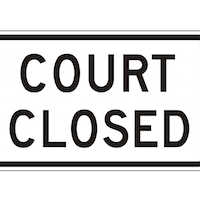U.S. Ninth Circuit Won’t Make L.A. Superior Court Reopen Closed Courthouses

Los Angeles County Superior Court slashed services and closed courthouses in a 2013 restructuring after the state Legislature whacked their budget. They were sued by groups who said the cuts fell disproportionately on the poor and disabled and denied them equal justice under the law.
The U.S. Ninth Circuit Court of Appeals agreed with that assessment on Tuesday, but ruled that the federal government was powerless to intervene. The case dealt with the narrow issue of “unlawful detainers,” actions that require a landlord to follow a strict eviction procedure for protecting the Fifth Amendment due process rights of a tenant.
The court acknowledged “that Plaintiffs raise serious access to justice concerns” but cited precedents that took a dim view of “heavy federal interference in such sensitive state activities as administration of the judicial system” in upholding a U.S. District Court ruling dismissing the lawsuit
The court said it had discretion to act in extreme cases but this was not one of them. “Out of respect for the independence of state judiciaries, a federal court cannot substitute its judgment for LASC’s resource allocation choices under these circumstances,” Judge Jacqueline Nguyen wrote for the court.
Those choices were made after a decade of cuts, accelerated during and after the Great Recession. Twenty of L.A. County’s 58 courthouses were closed after 2000. The much-lauded neighborhood court system was reduced from 26 locations to five hubs in downtown L.A., Long Beach, Pasadena, Palmdale and Santa Monica.
The court recognized their value: “This model, while costly, provided convenient access to justice for the residents of Los Angeles County because, for most types of cases—whether small claims, traffic, unlawful detainers, or criminal in nature—no one had to travel very far to attend court proceedings.”
In addition, other courtrooms were closed, personnel were laid off, services were curtailed and fees were raised. Statewide, California court budgets were slashed around $1.1 billion between 2008 and 2012.
L.A. Superior Court is the largest trial court system in the country, serving 10 million people. A budget snapshot (pdf) by the Judicial Council of California in February noted that the average wait time for a motion hearing in the downtown Stanley Mosk Courthouse increased 50%, or 40 days, since 2012.
The lawsuit, which sought class-action status, was brought on behalf of Union de Vecinos, Coalition for Economic Survival, People Organized for Westside Renewal, Independent Living Center for Southern California and two individuals. It specifically challenged establishment of the five hubs, because they forced the poor and disabled to travel long distances on short notice, often on sparse public transit, to fight evictions.
The lawsuit claimed the court closures violated the Fair Housing Act, Section 504 of the Rehabilitation Act, the Americans with Disabilities Act, and the First and 14th Amendments. More than 67,000 eviction lawsuits were filed in L.A. County courts during the last fiscal year, court spokeswoman Mary Hearn told the Los Angeles Times.
Two additional hub courthouses, in Van Nuys and Norwalk, were opened after the lawsuit was filed.
California Supreme Court Chief Justice Tani G. Cantil-Sakauye, in her state of the judiciary speech in April, said, “I am afraid California is on the wrong side of history when it comes to its funding of justice.”
–Ken Broder
To Learn More:
Fed Judges Let Stand LA Court Closures (by Pamela A. MacLean, Trial Insider)
L.A. Superior Court Doesn't Have to Reopen Shuttered Courthouses, Appeals Panel Rules (by Maura Dolan, Los Angeles Times)
Court Closures Not Feds' Business, 9th Cir. Finds (by Katherine Proctor, Courthouse News Service)
Lawsuit Filed to Stop Closures of L.A. Courts Critical to the Poor and Disabled (by Ken Broder, AllGov California)
Brenda Miles et al v. Judge David S. Wesley, State of California et al (U.S. Ninth District Court of Appeals (pdf)
- Top Stories
- Controversies
- Where is the Money Going?
- California and the Nation
- Appointments and Resignations
- Unusual News
- Latest News
- California Forbids U.S. Immigration Agents from Pretending to be Police
- California Lawmakers Urged to Strip “Self-Dealing” Tax Board of Its Duties
- Big Oil’s Grip on California
- Santa Cruz Police See Homeland Security Betrayal in Use of Gang Roundup as Cover for Immigration Raid
- Oil Companies Face Deadline to Stop Polluting California Groundwater




